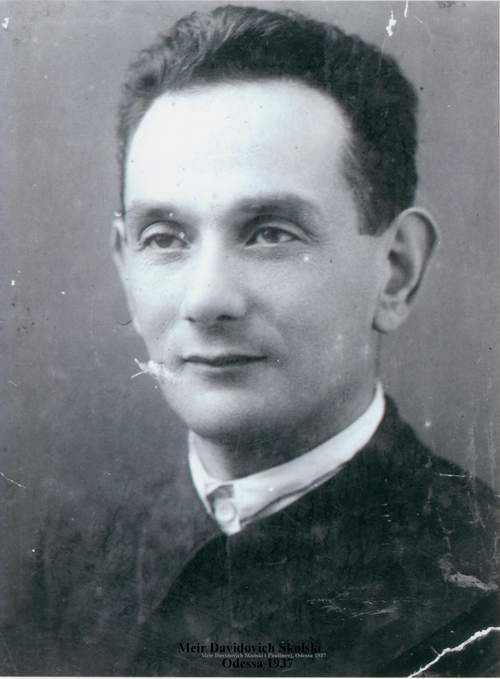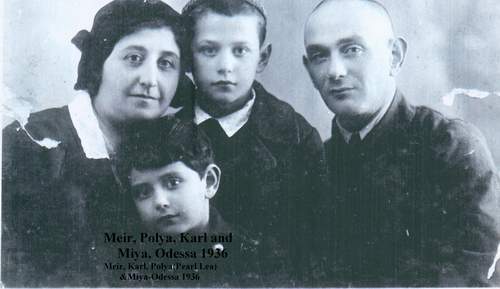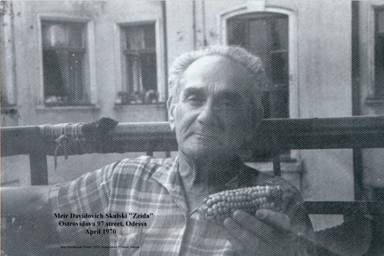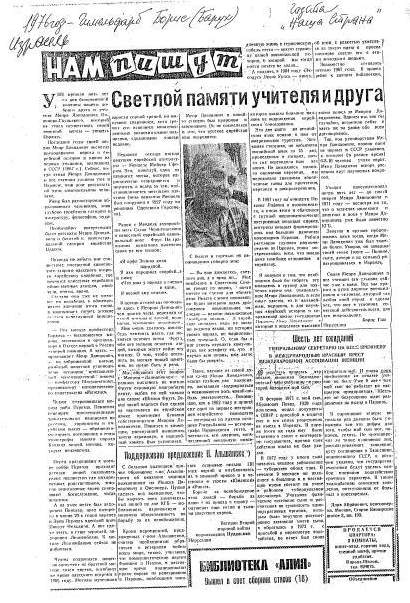A secret Ulpan in the Communist Odessa
By Anna Aizic
This article is an extract of the book "Circles of Life" by Anna Aizic.
You might want to purchase the complete kindle edition here
For any comment you can contact the author here
 Meir Davidovich Skulski "Zeida" established The first secret Ulpan at his appartment, Ostrovidova 97 street, in Odessa 1964-1971 (Zal")
Meir Davidovich Skulski "Zeida" established The first secret Ulpan at his appartment, Ostrovidova 97 street, in Odessa 1964-1971 (Zal")
Each time, visiting my grandfather Zeida's apartment involved a major adventure, novelty of surprise, mystery and risks, opening a world of secrets and discoveries, all wrapped with heavy curtains of mystery, away from the outside world.
He worked as a faculty at a financial Institution of Odessa, lecturing on accounting reports for over twenty five years. He was also an avid activist of the Zionist Organization of Odessa, representing them at the Kharkov Conference in 1903( organized by Menachem Ussishkin)- a protest conference of Russian Zionists followed by the Sixth Zionist Congress, at which Theodore Herzl proposed Uganda as asylum for the Jews.
And once walking in, the darkness left out and all that remained was pure wonder: chants of soft spoken people and fragrance of aunt Miya's pan fried potatoes.
Zeida's living room was transformed into a safe heaven from 1964 until May 1971.
It was an Eden, as the first Ulpan in Communist Odessa, a secret school where young Jewish students arrived for weekly lesson orchestrated by Zeida, studying the Hebrew language, literature and music of their people; all that was forbidden and deprived by the Communist authorities.
For seven years, once a week, a group of young people arrived to fill their hungry minds with Hebrew literature, the heritage and the future of the Jewish people in Russia.
After all, many years of debates, left Zeida with only one logical resolution: the inevitable return of the young Jewish generation to the One place they could call Home; the weekly meetings transformed young students into a people with renewed hope to reach the place they truly belonged to: Israel.
Behind the curtains of the crowded living room, the eager Jewish students gathered around Zeida, all attentively staring at a box, listening to… absolutely silence… nothing. And after the longest time of silence, none of us daring to eat the by now cold fried potatoes, suddenly to our relief a scrappy noise came out from the box.
It was a brown lacquered box, with the front wrapped in yellow tapestry, with three wooden knobs in the middle.
 Meir, Polya, Karl and Miya, Odessa 1936
Meir, Polya, Karl and Miya, Odessa 1936
After a while, the cacophony turned into soft murmurs and eventually, from poor transmission turned into a fascinating translation by Zeida, each time evoking excitement and debates to be shushed by the next squeaks from the box, followed again by silence, once Zeida spoke again.
With each new strange sound from the box, my heart jumped out of excitement for another mystery. Eventually, someone whispered "BBC..."
What an adventure… almost as good as the red hair cat we called Stalin and those fried potatoes from the iron stove Miya made for us.
How did Zeida manage capturing the broadcast from the WEST, London, under ever spying neighbors, remains another mystery of my childhood.
On several occasions spending overnights there, I heard strange noises, and was told it was nothing but my cousin's Devik Redhair cat, Stalin.
But Zeida was gone the next morning and the apartment seemed cold and foreign for days until his return, looking awful, dragging his feet, but alive.
What do they wanted? Who knows what the KGB was searching at Zeida's apartment. Was it because there was a traitor, a spy? Or maybe the red hair cat was to be blame for; Miya said I should never call him outside the apartment by his name: Stalin.
The word spread fast and after a while more and more people began arriving at Zeida's apartment; some out of curiosity, others were spies, but few of them turned into a loyal group for the years to come. They were introduced to Zeida by his friend Boris Gimelfarb who met a few young men at the concert of Nehama Lifshitz, a National Jewish freedom advocate (currently resides in Israel, she is an eighty five years old young and a lovely lady).
And a loyal group of few young men and their wives arrived short after: Lyona and Ina, Petya and Mara, Izya and Zenya, my parents Emil (Zeida's son) and Alla, and Nahum. All of them currently reside in Israel!
 Meir Davidovich Skulski "Zeida", April 1970
Meir Davidovich Skulski "Zeida", April 1970
Among this group of dedicated students one stood alone: a young man in his thirties, a talented photographer named Naum Slopack, his friends called him Nahum.
He was an avid activist of freedom, spreading around Jewish culture, copying forbidden poetry, studying books and records from Israel. Naum turned to be one of the most prominent Zeida's students: he was the first to master the Hebrew language, as well as the first of us to let go by the KGB and was considered our hero.
My Zeida passed away (Zal'), on May 1971 and the Ulpan was over. A month later, my family of four (my parents Emil and Alla, my sister Margalit and I) was the first family from Zeida's Ulpan to be allowed to leave Russia.
Other great students were Lyona Shaltz- a talented young engineer, living this days in Israel with his lovely family, Ina Shaltz (Zal"), kind and sweet piano teacher, survived by many grandchildren; Petya Golger, a dentist who was survived by two sons, a daughter and his wife Mara, currently residing in London, UK.
People said she is currently serving as dean of the London Tech, but I am not sure of that. You know people like gossip. All I know is that she was a prominent engineer graduated in Physics.
Zeida would have been very proud to know his beloved students and their many grandchildren are all currently residing at Home, living a life of free people in Israel. But Zeida himself did not make it:
On May 1971, Zeida was buried in the old Jewish cemetery of Odessa he used to visit quite often, among many famous poets, scientists and doctors.
 Article about Meir Davidovich Skulski by Boris Gimelfarb
Article about Meir Davidovich Skulski by Boris Gimelfarb
"Our Land", Jerusalem 1976
Boris Gimelfarb wrote about it in an article published in the newspaper "Our Land", Jerusalem 1976:
"Looking at that old photo you can see a few steps from Meir Davidovich Skulski's modest tomb, the resting place of the mother of the great poet Shaul Tshernihovsky, and a little further the resting places of Mendele "the book peddler", of Sholem Yankev Abramovich and of Solomon Moiseyevich Abramovich (December 21, 1835 - December 8, 1917), a Jewish poet and one of the founders of modern Yiddish and Hebrew literature. And a few steps away is the resting place of professor Bardah, who established the first Russian EMS service. And near there you'll find the resting place of the national Jewish Poet Shimon Frug, who’s modest tombstone was arranged by Zeida himself just one year prior his own funeral: he had the local mason engraving two words "Shimon Frug" in Hebrew letters, since the original marble monument was taken away during the Romanian occupation with other Jewish monuments to Bucharest.
And here, as you see this photo of overgrown shrubs and wild bushes, you can hardly see, but look closely: there is an old stone dedicated to men, women and babies butchered during the pogroms of 1905 and during the German and Romanian Occupation. Although the tomb is almost concealed by vegetation, it can not cover the horrors of the Odessa Massacre, where over 100,000 Jews were shot or burned in the area between the Dniestr and Bug rivers (including Babi Yar) in 1941-42."
DOR HAMIDBAR (Generation of the Desert)
Zeida never made it to Israel, albeit leading his small clan through the desert's dark years of oppressing Communist Russia.